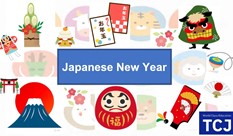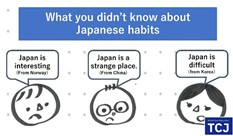Cross culture
Explore Japanese customs, manners, festivals, and communication styles to better navigate life and build connections in Japan.

What is White Day in Japan?
This page contains affiliate links. White Day is the day on March 14 when men who received chocolates on Valentine's Day return the favor to the woman. On White Day, the most common sweets are candies…

Setsubun: Welcoming Spring with Ogres, Beans, and Sushi
This page contains affiliate links. Famous for bean-throwing antics and parents dressed in ogre costumes to scare children, Setsubun is celebrated in Japan on February 2 or 3 (depending on the year) t…

Japanese New Year Traditions
This article is contributed by Tokyo Central Japanese Language School. This page contains affiliate links. Hello everyone! I'm Eri, a Japanese language teacher. January 1st is the beginning of the new…

Japanese Body Language and Gestures
The gestures and body language that Japanese people use may differ from the ones used in other countries. As an example, when a Japanese person says “I”, they will point to themselves with their index finger.The meaning of a person bowing can change depending on the angle at which they bow and so on. In this article we will introduce you to common gestures and body languages used in Japan.

Eating Outside in Japan: Know the Rules, Avoid a Food Fight
Japan is one of the cleanest, most well-kept countries in the world and consistently tops charts of safest and best places to live on Earth. With that, however, comes a complicated system of social bo…

Chopstick Etiquette in Japan : DOs and DON'Ts
This page contains affiliate links. Most people around the world are familiar with chopsticks these days, whether from eating out in a favourite Asian-cuisine restaurant or chowing down on cup noodles…

Restaurant Etiquette in Japan: How to Avoid Serious Mistakes
From grilled chicken skewers consumed standing in a smoky bar to the finest haute cuisine served course by course by a server clad in a traditional kimono, Japan offers an extensive range of food and…

Etiquette Guide: Why Do You Take Off Your Shoes in Japan?
If you have ever visited Japan, live in Japan, or even had some interaction with Japanese culture in your home country, you may be aware that taking off one’s shoes to go inside a residence is a commo…

Japanese Cleanliness: Japan’s Obsession with Tidying Up
This page contains affiliate links. Japanese cleanliness is one of the country's defining characteristics that is often remarked upon by tourists and new residents. Everywhere you go, whether it be an…

Japanese Personalities & Culture: Getting Along in Japan
Living in Japan, or even visiting, can be a significant shift from living in one’s home country and culture. Understanding new cultural norms, practices, and traditions can be difficult, and understan…

What you didn’t know about Japanese habits
This page contains affiliate links. The following article is contributed by Tokyo Central Japanese Language School. Nice to meet you all! My name is Eri, and I'm a Japanese teacher at a Japanese langu…

Business Card Etiquette in Japan – How to Exchange Business Cards
The ritual of exchanging meishi, which is Japanese for ‘business card,’ is a much higher valued practice in Japan than in the West. This guide will serve to help foreigners who are new to doing busine…

Seating Protocol in Japan - Seating Arrangements
In Japan there is an unspoken rule about where to sit when you are in the company of your elders, co-workers, and customers etc. There are seats known as “Kamiza” and a ranking of seats for “Shimoza”. This is a unique part of Japanese and its purpose is to show respect and hospitality to superiors and customers by being considerate about where you sit.

Japanese Business Manners and Etiquette
In Japan, there are rules of etiquette suitable for interactions between acquaintances, between customers and shop assistants in shops and in all other social situations. These rules and customs are a…

Japanese Business Gift Giving: Dos and Don'ts for Expatriates
This page contains affiliate links. For Western expats living in Japan, the frequency and occasions for giving and receiving gifts may be surprising. Not only are gifts given between loved ones and fr…

Japanese Punctuality in the Workplace
There are many differing opinions on the importance of punctuality and what time frame is considered 'on time.' In Japan, this is very important and can be the key to making a good impression, being a…

Japanese Verbal & Nonverbal Communication for Business
When it comes to business, Japan has a vastly different way of communicating compared to many Western countries; and those who fail to account for that difference often find themselves lost in the dis…

10 Most Convenient Daily Life Services in Japan for Expats
Living in Japan, it’s easy to notice how many everyday services are “just too convenient.” For foreigners, Japan’s lifestyle services are not only efficient but also impressively thoughtful. From shop…

Japanese Apartment Etiquette: Essential Rules for Expats
Adjusting to life in a Japanese apartment? Mastering local etiquette is key to a hassle-free experience! Understanding these essential rules will help you settle in smoothly and avoid cultural misunde…










